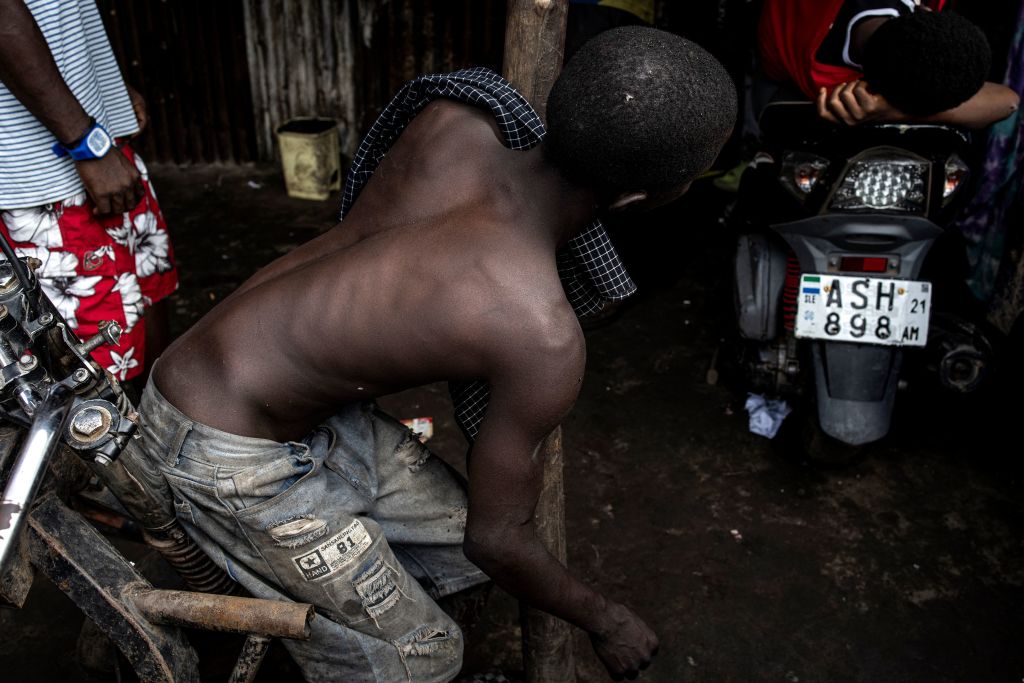A man in Freetown, Sierra Leone, inhaled from a kush cigarette, a synthetic drug that looks like marijuana but can be 25 times more powerful than fentanyl. He was one of dozens of people smoking the drug under a bridge, where trash and blankets are strewn in the dirt.
For a while, the man seemed to savor the drug’s effects, but he slowly nodded off. Seated, his chin slowly dropped toward his chest. Beside him, a man fell backward onto a tire, unconscious, his arms spread like a knocked-out boxer. Nearby, a young man also was unconscious but standing, his body contorted so severely that his head nearly touched the ground.
Elizabeth, a pregnant, 24-year-old mother of one, watched her fellow users. She acknowledged it is risky to smoke kush while pregnant.
“I keep smoking it because it makes me forget about my worries and challenges,” she told Sky News.
As Elizabeth wept, a shirtless 17-year-old boy named Ibrahim lay in the dirt and stones on a blanket of what looked like plastic foam.
“This drug is evil, this drug is bad,” he said. “I don’t know why they gave me this drug in this country. Our brothers are suffering, some are dying, some have sores on their feet. We don’t know. This drug brings destruction. Look at me. Just because of this drug, I have sores on my feet.”
Many of the users around Ibrahim and Elizabeth were malnourished and had infected sores on their limbs. Abu Bakr told Sky News he was 12 when he first smoked kush. Now 14, he had open sores on his feet so badly infected that he could not walk.
Despite its lethality and harmful side effects, kush remains popular due to the euphoria users experience — and its low price. In Sierra Leone, a single joint can cost just 5 leones (far less than 1 U.S. cent), and the effects can last for several hours.
The drug is often made with potent synthetic opioids called nitazenes, according to a 2025 report by the Global Initiative Against Transnational Organized Crime (GI-TOC) and the Clingendael Institute. Other ingredients, such as acetone, formaldehyde, tramadol and industrial solvents are sometimes used as filler.
Many of these chemicals are imported from China, the Netherlands and the United Kingdom. The final product often is manufactured and sold locally in unregulated laboratories, often in urban slums and areas where law enforcement is minimal. It is distributed by large-scale importers and financiers, and small-scale mixers, couriers and vendors, Geopolitical Monitor reported.
From Sierra Leone, kush use has spread to The Gambia, Ghana, Guinea-Bissau, Liberia and Senegal. Since 2022, it has likely killed thousands of people in West Africa, analysts say. Due primarily to the popularity of kush, Liberia and Sierra Leone declared national emergencies over drug use last year.
On the Gambian border with Senegal, police routinely search the vehicles of young men in efforts to seize kush. However, as Sky News reported, the border is so porous that official checkpoints are easily avoided. In Banjul, the capital, regular Gambian law enforcement raids seize far more marijuana and amphetamines than kush, suggesting that kush dealers mostly operate out of sight. A local law enforcement official said he was confident the kush crisis can be curtailed.
“Simply because we don’t take it as individual property, we take it as a national issue,” he told Sky News. “Everybody is involved.”
The news channel also spoke to young Gambian men who want to stop the scourge. A young man named Aziz said that he once smoked kush and felt like he was choking on his tongue. After he was hospitalized, his friends helped him conquer his addiction.
“It is very hard,” one of his friends said. “It is not just your advice that will make the person to stop using the drug. It is your advice and he or she being ready to accept to stop using the drug. That’s the only way.”
To address the scourge, the GI-TOC and Clingendael Institute report recommended that West African nations improve information sharing on synthetic drug compounds; increase regional capacities to identify, classify, seize and control synthetic substances; and enhance scrutiny at points of entry, especially in Sierra Leone.

